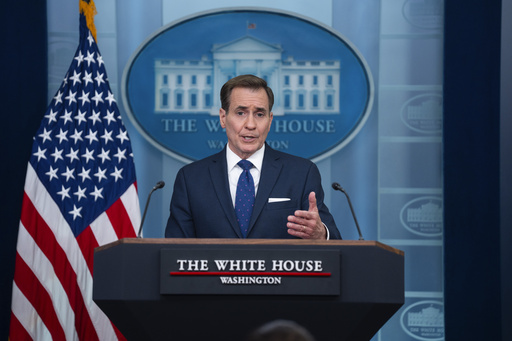WASHINGTON (AP) — Russia is shipping refined petroleum to North Korea at levels that exceed U.N. Security Council limits, the White House said Thursday, signaling it will impose new sanctions against those involved in facilitating the transfers.
The United Nations had set an annual 500,000 barrel global cap on refined petroleum products to North Korea as part of its yearslong effort to curb Pyongyang’s nuclear weapons program.
White House national security spokesman John Kirby said that in March alone, Russia shipped more than 165,000 barrels of refined petroleum to North Korea. With the close proximity of Russian and North Korean commercial ports, Russia could sustain these shipments indefinitely, he said.
The disclosure came the day after a U.N. panel of experts monitoring enforcement of sanctions against North Korea for its nuclear weapons and missile programs was disbanded. Russia, one of five permanent members of the Security Council, had blocked the panel’s renewal.
The Biden administration has declassified and publicized intelligence that shows that Russia has become increasingly reliant on North Korea, as well as Iran, for arms for its war in Ukraine.
“Russia’s actions are unprecedented for a member of the P5 to break a long-standing, consistent effort by the United Nations Security Council to support denuclearization and nonproliferation efforts,” Kirby said, referring to the permanent five members of the Security Council. “The United States is going to continue to impose sanctions against all those working to facilitate arms and refined petroleum transfers” between Russia and North Korea.
Earlier this year, the White House said North Korea had sent ballistic missiles to Russia that had been used in Ukraine. The White House in October said that North Korea delivered more than 1,000 containers of military equipment and munitions to Russia.
U.S. intelligence officials believe that North Korea, in return for its arms support, wants Russia to provide it with aircraft, surface-to-air missiles, armored vehicles, ballistic missile production equipment and other advanced technologies.
Russia’s turnaround on the U.N. monitoring reflects Moscow’s growing animosity with the United States and its Western allies since the start of the war in Ukraine. The tension has made it difficult to reach consensus on even issues where there had been long-ime agreement.
Kirby said that the U.S. would work with Australia, the European Union, Japan, New Zealand, South Korea and Britain on the expected follow-up sanctions over the petroleum shipments.


